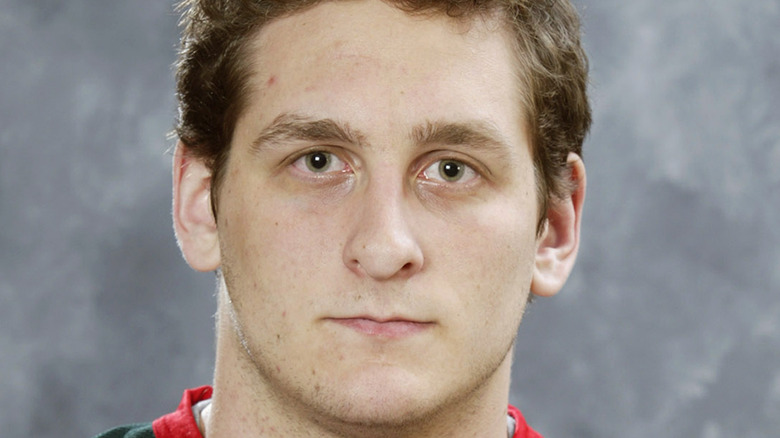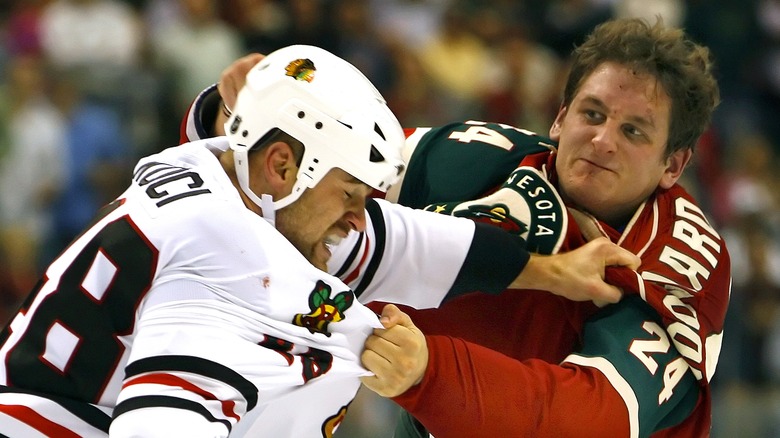The Heartbreaking Story Of NHL Star Derek Boogaard's Death
The following contains references to addiction.
The NHL has more than its fair share of secrets to hide, and many of the issues have to do with violence on the ice. It's not just the NHL, of course. Athletes from all sorts of sports deal with harrowing injuries from the intense impacts associated with their sports. Damar Hamlin of the Buffalo Bills can certainly attest to that, but he's thankfully on the road to recovery. Other athletes haven't been so fortunate, and many die young.
One such case involved NHL star Derek Boogaard, a Canadian-born enforcer who was so good at throwing punches that he was given the nickname "Boogeyman." After playing for several teams in the Western Hockey League — junior teams in Canada — Boogaard joined the Minnesota Wild and later the New York Rangers. While he was certainly sensational on the ice, Boogaard started to decline. He was showing signs of addiction, but also memory loss and a deterioration in brain functioning, according to The New York Times. At 28, he was found dead by his brothers after overdosing on drugs. But after he died, doctors discovered something going on in his brain that was causing the decline.
Derek Boogaard was diagnosed with a disease similar to Alzheimer's
After Derek Boogaard died on May 12, 2011, his family agreed to hand over Boogaard's brain for study. Dr. Ann McKee did the examination, according to The New York Times, and found out that the NFL star had chronic traumatic encephalopathy (C.T.E.), a condition that can only be confirmed after death. The outlet notes that the condition is much like Alzheimer's disease and largely occurs from continuous blunt impacts to the head.
The statistics around C.T.E. are shocking. As of 2011, more than 20 dead athletes were diagnosed with it. The fields of athletes diagnosed with the disease are wide, also including football players and boxers. Things first got rough for Boogaard when he was playing for the New York Rangers and got his first diagnosed concussion, according to Cleveland.com. The article referenced John Branch's biography of Boogaard, "Boy on Ice." There's no way that this was his first head injury, nor would it be his last. Fighting became such a signature experience of the NHL that when Boogaard took on another player, they were encouraged to make it sensational for fans, meaning they went hard. Boogaard gravitated toward drugs and alcohol for relief.
The role that drugs played in Derek Boogaard's death
Throughout his career in the NFL, Derek Boogaard sought treatment and went to rehabs for addiction treatment, specifically when it came to prescription drugs, according to The New York Times. Boogaard sought out painkillers, such as Vicodin, to ease the physical injuries that he was sustaining. He also took OxyContin and drank heavily. As time went on, Boogaard changed, and his teammates and his family noticed. Another player on the Minnesota Wild said, "His demeanor, his personality, it just left him. He didn't have a personality anymore. He just was kind of — a blank face."
When Boogaard joined the New York Rangers, he became a recluse in New York, exacerbated by his condition after a concussion. His family was still involved in his life and tried to monitor his pill consumption. On the night he died, brother Aaron Boogaard gave him a Percocet. But Derek Boogaard kept drinking that night and taking painkillers on his own. His other brother, Ryan Boogaard, arrived that night and when the brothers returned to the apartment after a trip to the airport, they found Derek Boogaard dead in bed from an overdose. "I looked and it didn't look right," Ryan explained. "Like, his chest wasn't moving."
Two people were charged after Derek Boogaard died when authorities connected them to his death, according to USA Today. His teammate, Oscar Johnson, provided Boogaard with the name of the doctor, Jordan Hart, who gave Boogaard prescriptions without proper consultations.
If you or anyone you know needs help with addiction issues, help is available. Visit the Substance Abuse and Mental Health Services Administration website or contact SAMHSA's National Helpline at 1-800-662-HELP (4357).



